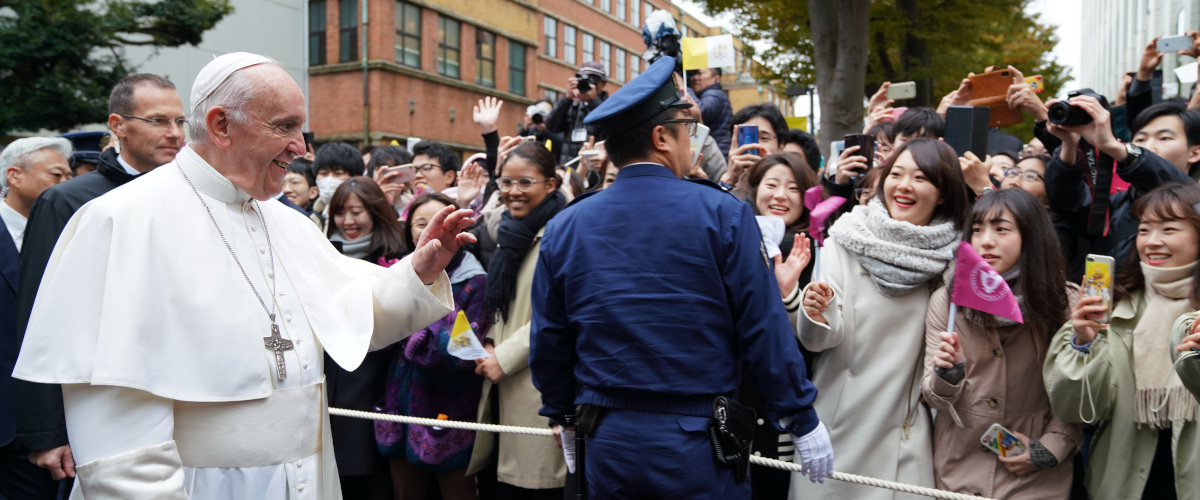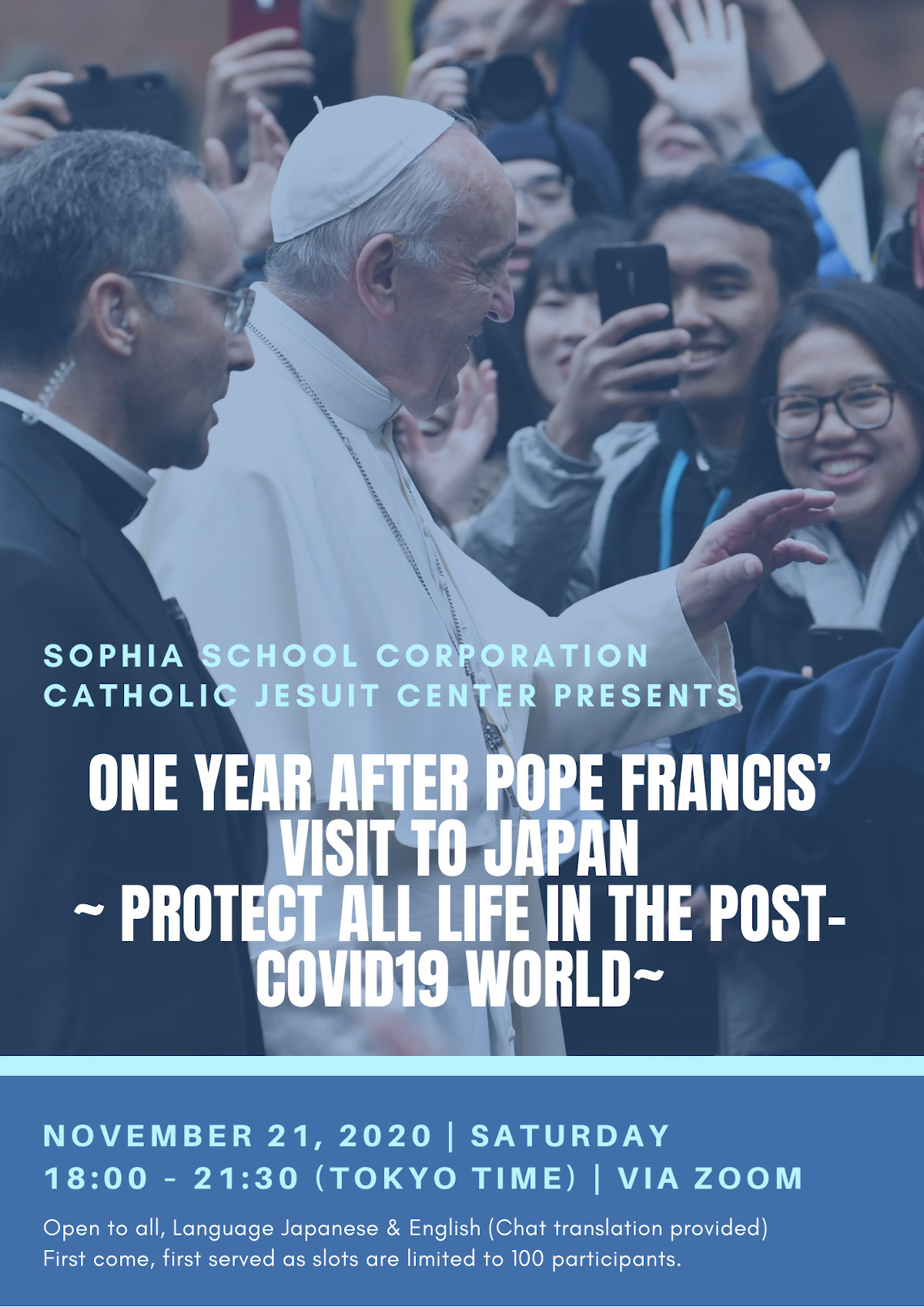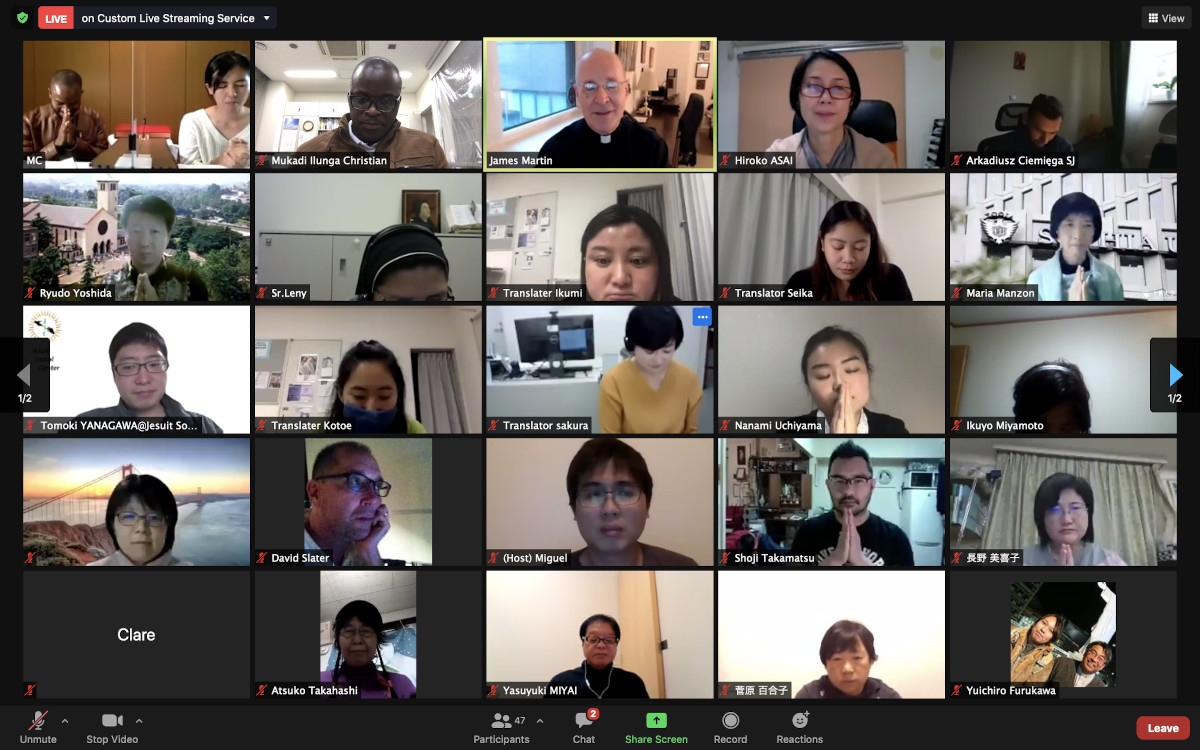 Pope Francis visited Japan in 2019 from 23 to 26 November, 28 years after Pope Saint John Paul II’s visit in 1981. His Holiness’ visit was short and dense with Masses, speeches, and public and private meetings, but it was also a time of prayer, grace, and joy. People remember his smiling face and contagious joy. The presence of the Pontiff, who represents the universality of the church, was for both Japanese and foreign residents in Japan a time of consolation.
Pope Francis visited Japan in 2019 from 23 to 26 November, 28 years after Pope Saint John Paul II’s visit in 1981. His Holiness’ visit was short and dense with Masses, speeches, and public and private meetings, but it was also a time of prayer, grace, and joy. People remember his smiling face and contagious joy. The presence of the Pontiff, who represents the universality of the church, was for both Japanese and foreign residents in Japan a time of consolation.
 Protect all Life in the time of Covid-19 Pandemic is the theme for the first anniversary of Pope Francis’ visit in Japan. Sophia University, through the Catholic Jesuit Center, in collaboration with St Ignatius International Youth Ministry (SIIYM) and the Jesuit Social Center, has two online events to commemorate the occasion. The first of these was held on 21 November.
Protect all Life in the time of Covid-19 Pandemic is the theme for the first anniversary of Pope Francis’ visit in Japan. Sophia University, through the Catholic Jesuit Center, in collaboration with St Ignatius International Youth Ministry (SIIYM) and the Jesuit Social Center, has two online events to commemorate the occasion. The first of these was held on 21 November.
Fr Renzo de Luca SJ, Japan Provincial and Pope Francis’ interpreter during his visit, talked about the Pope and the youth. American Jesuit Fr James Martin SJ held a question-and-answer session on global challenges affecting young people in the post-Covid-19 world, a theme which embraced several topics, among them: the Church, Virgin Mary, Pope Francis, the film Silence, and LGBTQ people. Professor David Slater from Sophia University and Rosa Barbara, a graduate Student of Sophia, gave a talk on the situation of refugees in Japan during Covid-19.
The Pope’s visit was an opportunity for the Catholic faithful in Japan, which constitute around 0.3 per cent of the Japanese population, to be once more confirmed and encouraged in their faith. It was an occasion likewise for all people of good will, regardless of religious traditions and affiliation, to reflect on the Pope’s message, meant not only for Japan but for all the world: Protect all life!
With this theme, the Holy Father called for the abolition of nuclear weapons because it is a sin and for the protection of our common home. These messages echo in both Laudato si’ and Fratelli Tutti. Laudato si’ calls us to an ecological conversation and gives us main inputs for an ecological theology, while Fratelli Tutti gives us major insights on a theology of politics and economics based on fraternity and social friendship.
Participants shared their takeaways from Pope Francis’ message and reflected on the strong connection between the protection of all life and the challenges we face with the Covid-19 pandemic. On 27 November, His Eminence Michael Cardinal Czerny SJ will continue the sharing with a lecture and open forum on migrants and refugees in the time of Covid-19 and how a new generation is responding to this challenge. Both events are opportunities to see the Holy Father’s message as a kind of viaticum for the post Covid-19 world.
 Pope Francis’ meetings with young people, both in Saint Mary’s Cathedral (Tokyo) and in Sophia University, were deeply moving encounters. In his address to the youth at Sophia University, he emphasised that in a society oriented towards competition and innovation like Japan, it is important for young people to be rooted in the spirit of true wisdom and discernment. In life what matters is not the question of “What do I live for?” but “Who do I live for?”
Pope Francis’ meetings with young people, both in Saint Mary’s Cathedral (Tokyo) and in Sophia University, were deeply moving encounters. In his address to the youth at Sophia University, he emphasised that in a society oriented towards competition and innovation like Japan, it is important for young people to be rooted in the spirit of true wisdom and discernment. In life what matters is not the question of “What do I live for?” but “Who do I live for?”
Accordingly, another highlight of the anniversary celebration is the creation of the Pope Francis Visit Memorial Fund to support efforts that address the challenges embodied in Pope Francis’ message to protect all life. Since last year, Sophia University has been embarking on projects to take Pope Francis’ message to heart and respond in a fitting manner. Among others, the fund will be used to support a special scholarship and awards programme that recognises activities and efforts of students, faculty, staff, and affiliates that embody the message of Pope Francis. These include teaching, research, extracurricular activities, and work practices broadly related to the message of the Pope’s visit and the Universal Apostolic Preferences of the Society of Jesus.
When Pope Francis visited Sophia University, he recalled that as a Jesuit university: “Sophia University has always been marked by a humanistic, Christian, and international identity.” At the same time, he said: “The Ignatian tradition, on which Sophia is based, ought to inspire professors and students alike to create an atmosphere that fosters reflection and discernment. No student of your university should graduate without having learned how to choose, responsibly and freely, what he or she knows in conscience is best. In every situation, even the most complex, may they be concerned that their conduct is just and humane, conscientious and responsible, and show themselves resolute defenders of the vulnerable. May they be known for the integrity so greatly needed in these times when words and actions are often either misleading or deceitful.”
Sophia University hopes that the commemoration of Pope Francis’ visit and The Pope Francis Visit Memorial Fund will help strengthen the university’s rootedness in its Catholic and Jesuit identity and tradition in the context of dialogue with culture and religions.
 Christian Mukadi Ilunga SJ is a scholastic from the Democratic Republic of Congo and missionary to Japan serving his Regency as a Campus Ministry Officer at Sophia University in Tokyo.
Christian Mukadi Ilunga SJ is a scholastic from the Democratic Republic of Congo and missionary to Japan serving his Regency as a Campus Ministry Officer at Sophia University in Tokyo.

